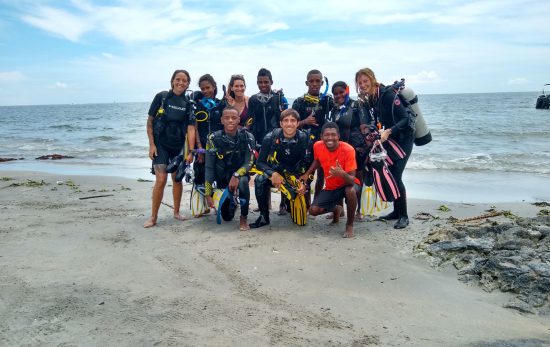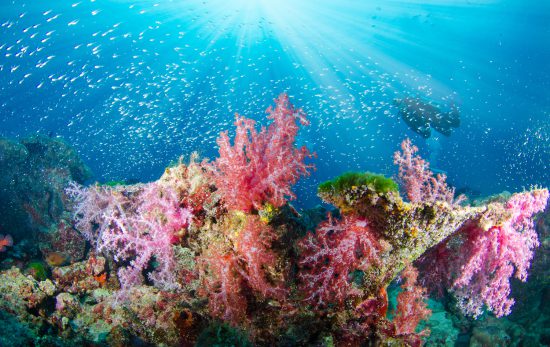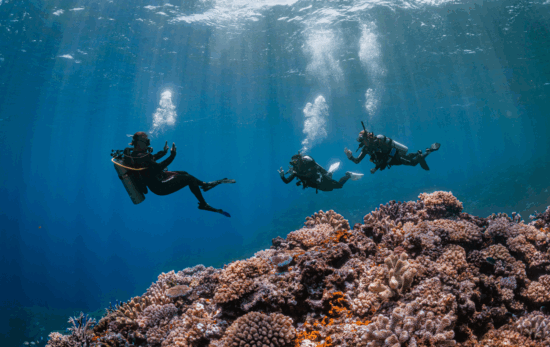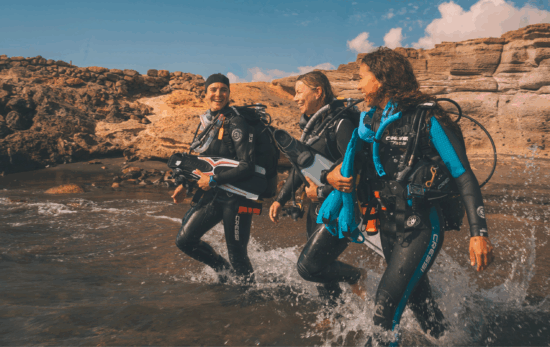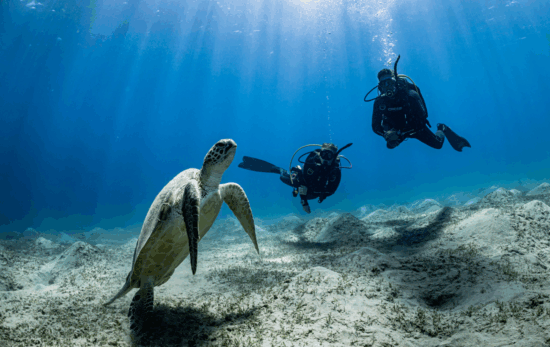“All drains lead to the ocean,” says Pixar’s character Gil in the popular 2003 animation, Finding Nemo. While not literally true, his words remind us that changes affecting the sea for better or worse start everywhere. Pollutants and plastics dumped haphazardly hundreds of kilometres inland will find their way to the ocean through the water cycle, inflicting damage as they go. But, any community anywhere shifting to renewable energy takes a step away from oceanic warming and acidification.
What this means is that no matter where we are, we are always in the right place to be PADI Torchbearers leaning in to restore the balance between the oceans and humanity. Although the pandemic is restricting and limiting where many of us can go and when, we can take action right where we are.

First and foremost, wherever you are, go diving if you can. With tourism and other watersports temporarily restricted or shut down, ecotouring divers who were a primary human resource for local initiatives like coral planting, reducing invasive species, documenting and removing plastics debris, and other care for adopted dive sites, aren’t available. The underwater world is relying on local divers to step in until visiting divers return, and it makes a difference where it’s happening. In locked down Egypt, local divers cleaned seven tons of trash from Red Sea reefs as did divers in the Phi Phi islands.
Coral restoration is on the rise (even during the pandemic), but as in these eight examples, it relies on volunteer divers. As Sea Hero Mike Goldberg, cofounder of I.CARE, which is restoring coral in the Florida Keys, says, “I.CARE needs recreational divers in mass to help with transplants, maintenance and reporting. Thanks to the economic strife caused by the pandemic, we anticipate fewer traveling divers in the near term.” In other words, they need local divers.
And, it’s not just coral and the ocean. Inland, divers like these remove debris, document control invasive species, conduct research, etc. Diving locally now to help the underwater world is not only important for the environment, but it helps your local dive shop at a difficult time, and it’s fun and rewarding. (BTW, click here to find out where diving is open.)

Second, think of what you can do better right where you are. By this I mean, beyond the day-to-day steps we all take as mindful Torchbearers, each of us has unique opportunities to make a difference if we pause, find them and act. For example, people at the CPI Card Group realized that the 6.4 billion credit/debit cards sent out annually can be made of recycled plastic, and that’s what they use now – keeping an estimated 1 ton of plastic out of the seas for every 1 million cards made. (BTW, PADI certification cards also use recycled plastic, as do PADI Gear partners.)
Living on Bali, AVANI Eco founder Kevin Kumala took on the grocery bag/soda straws/disposables problem by creating biodegradable ones. Similarly, Saltwater Brewery in Delray Beach, Florida, USA, created edible, biodegradable beer can packaging rings that don’t kill aquatic life. You may be surprised at the differences you can make if you look at what’s around you with a Torchbearer perspective.
Third, invite people to become PADI Torchbearers. Saving the ocean will take billions of us working together, uniting our different perspectives, cultures and talents, so they don’t have to be divers – they only have to be people who care about a sustainable, healthy ocean. Whether you’re in person or on online, share your experiences, images and this link, and let them know they can be part of shaping a preferred future. And that diving’s a cool way to be part of doing it.
Seek adventure. Save the ocean.
Dr. Drew Richardson
PADI President & CEO

